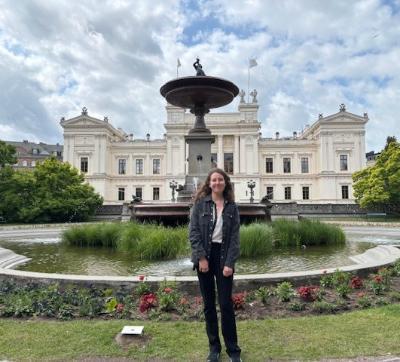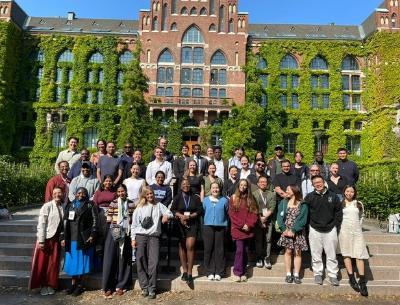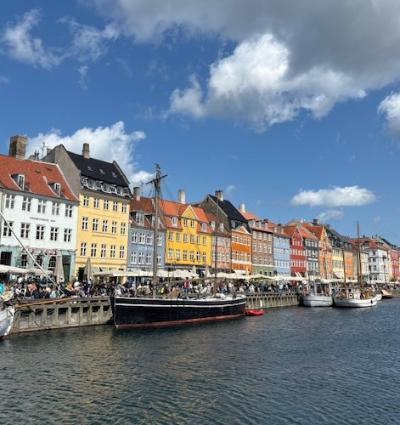UCD MSc International Relations and Politics graduate Elena Lliso attended the U21 Summer School on Sustainable Policy Leadership in Lund University, Sweden in June 2025. In the guest post below, she shares her experiences of the programme.

Why did you apply for the U21 Summer School?
I applied for the U21 Summer School in Lund because it felt like a unique opportunity where everything aligned: my academic interests in a field I wasn’t too familiar with, my personal values, and my curiosity about the world around me. The theme of Sustainable Policy Leadership immediately caught my eye. To me, it felt relevant, timely, and deeply connected to what I’ve been studying and thinking about, especially as a master’s student in International Relations, watching the climate crisis unfold alongside conflict and growing inequality across borders.
I’ve always been fascinated by how policies are made and who gets to shape them. I grew up between different cultures and have spent the last few years digging into how power and influence work on a global stage. This programme felt like a natural extension of that curiosity: a space to explore sustainability not just as an environmental issue, but as a political, social and ethical one.
I also saw this as an opportunity to expand beyond my comfort zone, to challenge myself and learn from brilliant students and experts from all over the world, each bringing their own vision for the future. I wasn’t looking for another theoretical discussion. I was looking for connection and a hands-on application of theory in practice.
What did the U21 Summer School look like?
The programme took place in Lund, Sweden, which is a beautiful and historic university town that immediately gave off a strong academic vibe. However, it wasn’t just the setting that stood out. It was the atmosphere: diverse, intense and genuinely inspiring. Around 45 students from more than 20 countries came together, each bringing their own background: medicine, engineering, law, economics, public health, politics – and each contributing something unique to the discussions.
The theme, Sustainable Policy Leadership, was approached through interactive lectures, group work, and simulation exercises. It wasn’t passive learning. We were constantly participating, thinking on our feet, and working across disciplines. The facilitators were there to guide, not dominate, and the format encouraged us to think critically and creatively.

What sparked your interest in Sustainable Policy Leadership?
My interest in sustainability leadership comes from a deep awareness that global challenges don’t exist in silos. Climate change isn’t just an environmental issue; it is a governance issue, a justice issue, a security issue. I have seen, through both my academic work and international experience, how policies can either bridge gaps or deepen divides.
Studying International Relations and working on topics like hybrid warfare and global power structures, I have realized how essential it is to equip the next generation of leaders, not just with knowledge, but with the mindset to think systemically and act ethically. Sustainability isn’t about quick fixes. It is about long-term thinking, collaboration and accountability. That is the kind of leadership I am drawn to.
What activities did you participate in?
We dove into a variety of activities that pushed us outside our usual academic comfort zones. One standout moment was a policy simulation where we had to act as government advisors responding to a fictional but highly realistic crisis. It involved negotiation, drafting proposals, and defending policy choices under pressure. It was chaotic, challenging, and very real.
We also had deep-dive sessions on systems thinking, decision-making, and stakeholder mapping – tools that helped us approach sustainability through a strategic, interdisciplinary lens.
Outside of the formal programme, we had social events, cultural dinners and long conversations that often ran late into the evening. The friendships formed during those unstructured moments were just as impactful as the lectures.

How did the U21 programme impact you?
This experience came at exactly the right time. After months of thesis writing and solo academic work, I needed something energizing, and this gave me exactly that. It helped me reconnect with why I chose this field in the first place.
On a personal level, I left feeling more confident in my voice and ideas. I contributed, listened, adapted, and learned from people with completely different perspectives. On an academic and career level, it reinforced my desire to work in international spaces where policy meets people, where sustainability is treated not as an afterthought, but as a core value. It also reminded me that leadership isn’t just about knowing the most; it is about navigating uncertainty, building trust and creating space for others.
** See more of Elena's journey on (opens in a new window)Instagram **